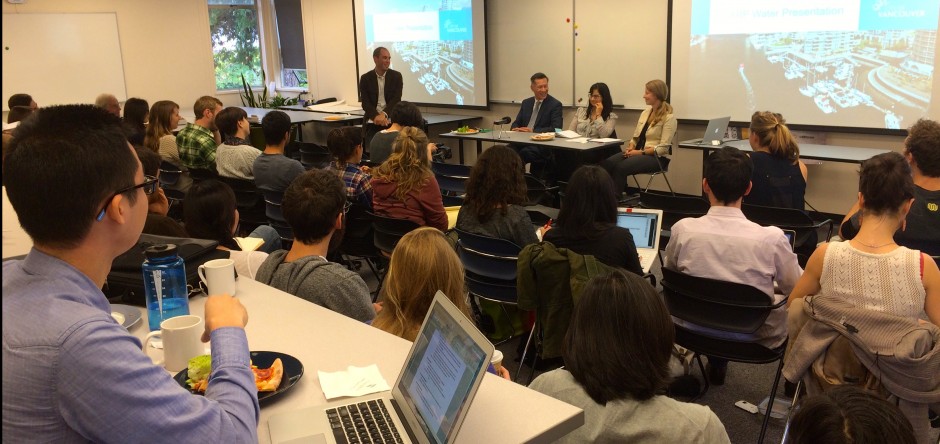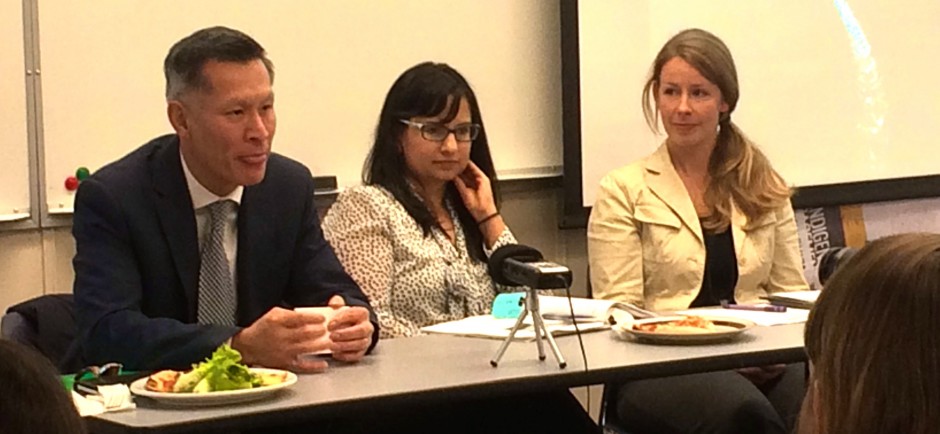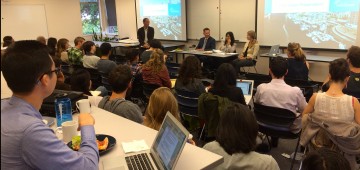What are the policy challenges for managing water resources in Metro Vancouver? What programs are being implemented to improve water efficiency?
On Monday, October 27th 2014, students, faculty and members of the public joined panelists, Raymond Fung (Director of Utilities and Transportation for the District of West Vancouver), and Kyra Lubell and Shelley Heindricks (Policy and Planning Analysts, respectively) from the City of Vancouver, in a conversation about municipal water policy in BC.School of Community and Regional Planning Professor and Water Planning Lab Director, Jordi Honey-Rosés, moderated the event that included opening presentations followed by a discussion among panel members and the audience.
Despite the region’s “Raincity” moniker, all panelists pushed against the notion of water abundance by highlighting major stressors that are jeopardizing the sustainability of Vancouver’s water supply and distribution network.
Climate change is changing our weather patterns and resulting in a shrinking snowpack and reducing the predictability of rainfall. Population growth is also adding pressure to the system. Given these stresses, municipalities are looking to reduce water demand—an approach which is ecologically and economically sound.
“What strategies are municipalities using to reduce water demand?”
Raymond Fung, Director of Utilities and Transportation with the District of West Vancouver, responded to this question by discussing the universal residential water metering program—a unique policy in the Metro Vancouver region.
“Seventy percent of our water [was] being used by sixteen percent of our users”, said Fung when explaining West Vancouver’s motivation for metering. “This was inequitable”. Fung pointed out that prior to installing water meters, high water users were essentially being subsidized by low water users.
The implementation of volumetric pricing, in which the unit price for water increases as consumption increases, has created an incentive for residents to reduce their consumption. Furthermore low-consuming residents are rewarded for doing reduced water consumption with lower utility bills.
“Metering”, however, Fung was quick to point out, “does not conserve water; the reason it is useful is that it provides data.” The data is used to promote more sustainable behaviour and can help the municipality in evaluating the effectiveness of water conservation programs.
Since introducing universal residential metering in 2007, residential consumption has declined 25% in the District of West Vancouver.
When members of the audience asked why the City of Vancouver has not followed West Vancouver’s lead on residential metering, Lubell and Heindricks pointed to the financial cost of meters and the relative diversity of water consumers in Vancouver (residential, industrial, commercial, institutional) whereas West Vancouver was nearly all residential.
Despite the absence of universal residential metering, the City of Vancouver has seen promising declines in residential consumption, moving them closer to their Greenest City goal of a 30% per capita consumption reduction. As of “2013, residential consumption has gone from 320 lpcd to 260 lpcd, since 2006. One way to explain this per capita decline, Fung suggested, is that “they’re putting a lot of multi-family units up with smaller footprints”. Given the high water use associated with gardens and lawns, multi-family housing is expected to use less water than detached single-family homes.
In addition to requiring metering in all new or significantly renovated dwellings, Vancouver’s residential water consumption reduction strategy has focused on providing incentives for technological improvements such as subsidies for low-flow toilets and showerheads, a subsidized rain-barrel program, as well as education and the enforcement of lawn sprinkling regulations.
Despite downward consumption trends in the residential sector, however, the City of Vancouver is troubled by “double-digit increases in non-residential sectors”. Lubell explained that the City of Vancouver is prioritizing water reductions in the “ICI sector” (industrial, commercial and institutional). In particular, the City is looking at benchmarking for certain industries, such as breweries, who are high water consumers, and creating “water wise” certificates that high performing water-saving companies can earn and market to their customers.
After the event Masters of Planning student, Blair Underhill commented on West Vancouver universal water metering policy, “I think it would be impressive if all municipalities could implement this infrastructure. It would have beneficial results in water efficiency for the Metro Vancouver region.”
Veronica Reiss, also a Masters of Planning student, reflected on the event saying it was a “great opportunity to talk to some of the people guiding water policy creation and implementation in the Metro Vancouver region.”



